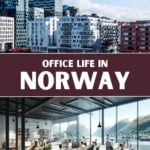From the flat hierarchy to the short but communal lunches, there’s a lot to understand about everyday life in a Norwegian office. Let’s take a closer look.
So you’ve landed your first office job in the land of the Vikings. Grattis! But what can you expect to encounter behind the sleek doors of the minimalistically furnished office?
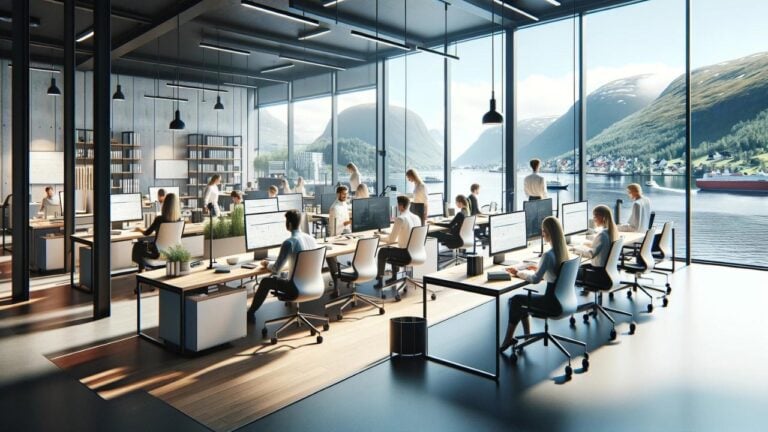
Office culture varies a lot from one country to the other, and Norway is no exception. Some differences are quite major, others amount to quirky details that just take some getting used to.
So, hold on to your open sandwiches! Whether you’re embarking on a new career in Norway or looking for a job vacancy and just curious to see how things are done, join us for this deep-dive in the world of Norwegian office life.
Work-Life Balance in Norway
Work-life balance in Norway is legendary. As a salaried worker, it’s one of the best perks of working in the country. It starts with vacation. Everyone is entitled by law to four weeks plus one day of paid holiday.
That being said, the law is one thing and the general practice is something else: ask any Norwegian office worker how much vacation the law entitles them to and chances are they’ll say five weeks. That’s because most workers have collective agreements that include provisions for that fifth week.
Even if they don’t: it’s quite common to get five weeks paid vacation regardless. This is not free money of course: the money you receive during your holidays comes from deductions to your pay the rest of the year.
For this reason, you have to work a full calendar year at a new workplace to get a full 5 weeks of paid vacation. You’re still entitled to have time off before that, but at your own expense.
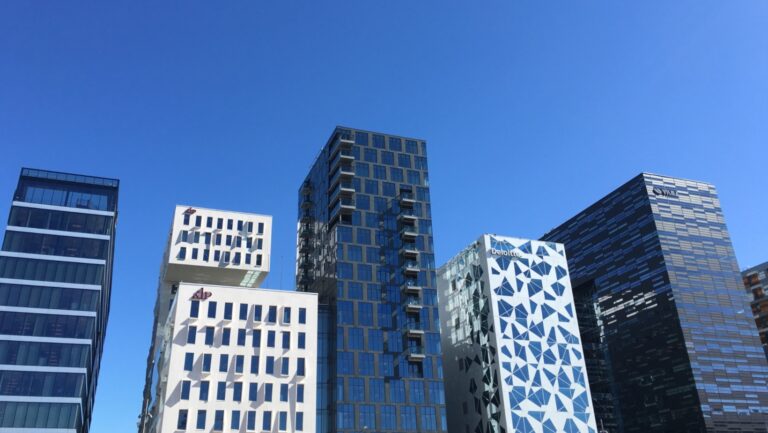
Work-life balance also means a year of parental leave, and a number of paid sick days, plus a number of days to take care of your sick children. The work day typically begins somewhere between 7am and 9am, and ends somewhere between 3pm and 4pm.
Parents with children will often leave early to pick up their kids from school or kindergarten, and nobody bats an eye. From that perspective, Norway is a great place to have children – when thinking of the logistical side of things at least.
Lunchtime in a Norwegian Office
If you’re used to and enjoy having a one hour lunch break, I have bad news for you. Lunch break in Norway is typically a half hour. Personally, it took me a few years to get used to this. I just could not eat at that speed, initially.
To compound the difficulty, not only do you have to stuff your face a lot quicker than normal, but you need to start doing it way earlier than you’re used to. Lunch break in Norway often starts at 11:30, and it’s not unheard of for people to start as early as 11.
There are two solutions to this: on the one hand you can ignore the local customs and eat at 12 or 12:30, but that means you’ll be missing out a bit on the social aspect of lunch.
On the other hand, you can bite the bullet, skip breakfast, or fast the previous evening. Whatever you have to do to be hungry at 11:30.
Lunch being such a brief affair means there’s no time to go out. You can either get food at your workplace’s cantine, if there is such a thing, or get in on Norwegian matpakke culture. A matpakke is essentially a very simple packed lunch.
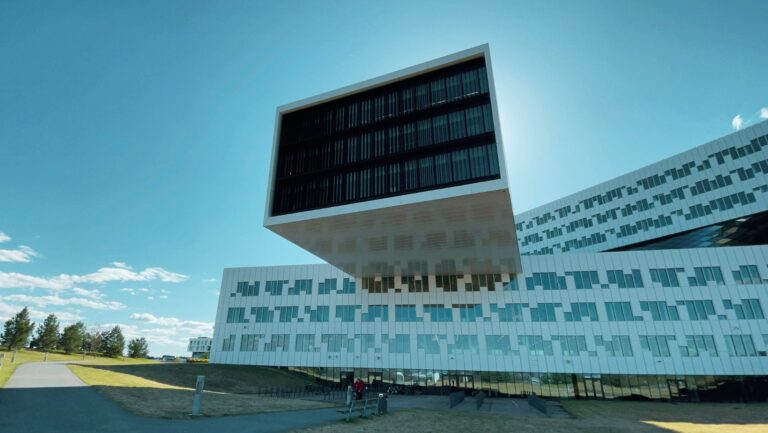
If you do go for the cantine, here’s a bit of good news. Food from workplace cantines/cafeterias is often subsidised by the employer, meaning that it will be significantly cheaper than eating out anywhere else.
Alcohol and Work Culture in Norway
Norway has a love-hate relationship with alcohol. Local culture is very accepting of binge drinking as something that just happens – and is sometimes almost expected depending on where you work.
Simultaneously, rules and regulations are very stringent about what can and can’t be done relative to alcohol, and booze is subject to extortive punitive taxes meant to discourage you from drinking.
That being said, drinking with colleagues is a thing. There’s even a word for it: lønningspils, which we covered in our list of untranslatable Norwegian words, and roughly translates to “salary beer” or “payday beer.
You may be surprised at how many pints Norwegians can handle in one sitting. If drinking that much is not your thing, bear in mind that it seems to be easier for many people to accept someone not drinking at all than someone drinking moderately.
The office Christmas party, the Julebord, deserves an article of its own, which you should definitely go read when you’re done with this one if you want more insight into the office/alcohol dynamic.
Another quirk of alcohol and work culture in Norway is the “wine lottery” – I have never encountered this personally but have heard of it on several occasions.
Essentially, it’s a raffle where the prize is a bottle of wine. The money usually just goes to buy more wine, but can also serve to finance other social activities.
The reason it feels worth mentioning is because of how it clashes with the country’s rules and regulations about alcohol.

Even weirder is that Norway’s otherwise strict alcohol laws seem to have a loophole especially written in to allow workplace wine lotteries. Disclaimer: Just my interpretation, I’m no lawyer!
Working in Norway: boss-employee dynamic
Another disclaimer: I will now make generalisations based on my personal experiences in Canada and in Norway. This is not scientific. Your own experience may vary.
In previous jobs in Canada (I won’t be any more specific lest old ghosts come back to haunt me) there was sometimes animosity, or even hostility, between management and staff. It was almost as if we were on completely different teams, with completely different objectives.
I’m not saying that’s the case at every workplace in Canada. The company I worked for struggled with chronic downsizing at the time and that’s never good for morale.
My point is that I have never encountered anything coming close to this kind of negativity in any of the multiple jobs I’ve held in Norway.
Employers and employees in Norway are largely on the same team, and while disagreements do occur, everyone seems just so… reasonable about it.
Flat Hierarchy of the Norwegian Workplace
If I were to guess, I would say that at least part of the reason why relations between management and staff can seem so harmonious is the flat hierarchical structure of Norwegian offices.
What this means is that compared to workplaces in the US, the UK, or indeed Canada, there are relatively few levels of authority and management between the top leadership and the rest of the employees.
This usually means an increased focus on collaboration, open communication, and shared decision-making among employees at different levels.
The positive side of this is that employees can feel they are benefiting from a high level of trust, which empowers them to better help their company’s success. The opposite of that would be an employer who manages, measures, evaluates, dictates.
Norwegian Employee Reviews
Nothing exemplifies this better than the Norwegian term for “employee appraisal”: medarbeidersamtale. Literally translated, it means “co-worker conversation”. The notion of appraisal, evaluation or criticism is completely gone.
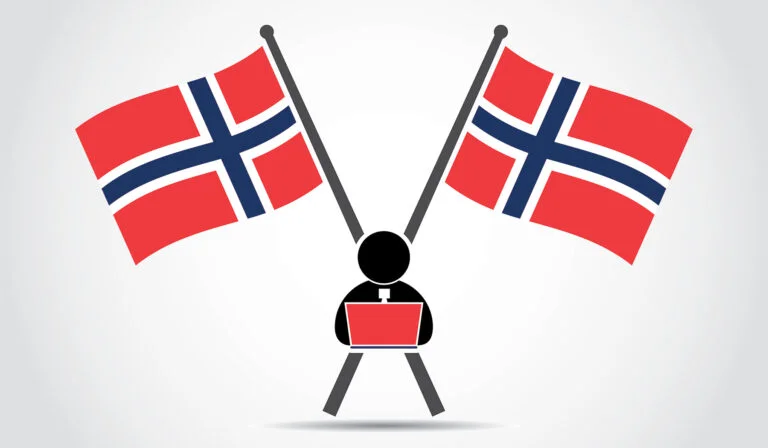
And it’s not just the name that’s different, but the thing itself. Again, this is just based on my own personal experience, but while in Canada the talk was entirely focused on my performance and progression, in Norway I’m actively encouraged to give my opinion about how things are going.
Of course, the boss doesn’t have to do what you say during that conversation, but at least it gives you a sense of having some kind of influence into the way things are run.
The medarbeidersamtale experience, to me, seems so far from the “employee appraisal” that translating one term as the other seems wrong.
The Downside of a Flat Heirarchy
But there is a flip side to flat hierarchy. Sometimes, it can increase complexity. Say you’re working on a big project.
You go to meetings, you get briefed and get a sense of what it is you’re supposed to do. You perform the task to the best of your ability and then present the result to the people who initially gave you the task.
But suddenly, other people come out of the woodwork that were not involved until just now, and they have plenty of opinions about what you did and how they would have done it differently. Because of the flat hierarchy, their opinions are valued as highly as if these people had been involved from the get go.
So suddenly you have to make changes to satisfy these people whose desires you knew nothing about initially. It can be frustrating, and it can even make you wish there was a high-handed manager putting an end to the nonsense.
That being said, on the whole, the flat office hierarchy has many benefits that far outweigh the frustrations it can cause.
Trade Unions in Norway
Trade unions are definitely a thing in Norway. About half of all workers are unionised.
A fair share of my professional life was in Québec, where union membership is obligatory if there is a union at your workplace. Now I understand that that’s a particular situation, but Norway’s way of doing things could not be more different.
Union membership is optional, even if there is a specific agreement between your employer and a designated union for your position. Not only that, but you can pick pretty much any union you want.
Sometimes people switch jobs and don’t bother switching unions. The general feeling is that as long as you’re unionised, you’re “pulling your weight” when it comes to securing good work conditions and proper compensation – exactly which union you’re backing is just a detail.
People who decide to forego unions entirely might get gently coaxed to join, but in my experience, their choice is largely respected and a non-topic at work.
If you do decide to join a union, bear in mind that some of them support certain political parties, so you may want to investigate that based on your own political preferences, before you decide who to join.

